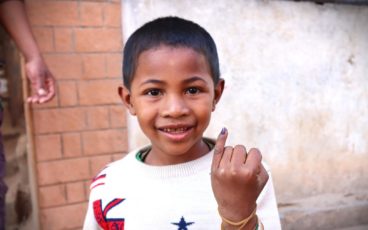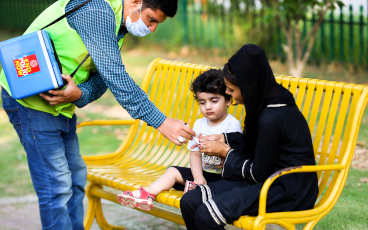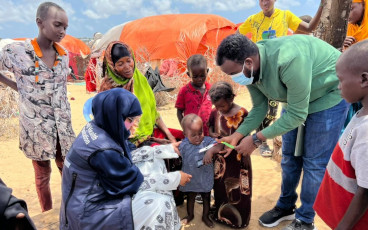Extraordinary chains of coordination to detect poliovirus amidst Sudan’s conflict
At the earliest signs of the ongoing conflict in Sudan, in the middle of April, WHO’s country team sprang into action. After all, conflict and infectious diseases are known to be comrades.
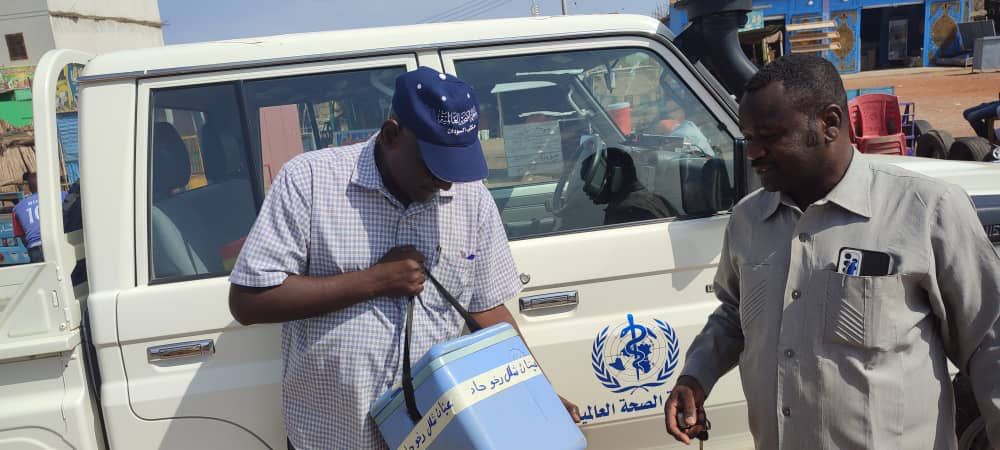
One of the first tasks they took on was to find ways to detect the possible spread of an outbreak of variant poliovirus that was confirmed in December 2022 after a paralysed child living near the border with Chad tested positive for the virus. Immediately after the start of the conflict, they worked to maintain the essential function of surveillance for acute flaccid paralysis (AFP) – the most common symptom of polio – in children.
Prioritizing essential polio functions
Much like a relay race, in AFP surveillance, speed and coordination are key. Once health teams find a child with AFP, the race begins. But emergencies often present additional hurdles. In one of the localities in Sudan’s White Nile state, Ahmed Masaood, a health worker, was tasked with collecting two stool samples from a child presenting with AFP. However, when the roads outside turned unsafe during Ahmed’s visit, he ended up having to seek refuge with the family he was visiting for two nights. As soon as he could, he rushed to the state cold room with his stool carrier to drop off the samples for storage until they could be tested.
The next lap of the race involves getting children’s stool samples to a WHO-accredited laboratory for testing. Due to the conflict, Sudan’s polio laboratory is not functioning, which meant the polio programme urgently needed to look for another laboratory to test stool samples to determine if children presenting with AFP had indeed been infected with poliovirus.
In a remarkable partnership, Sudan’s polio programme teamed up with Egypt’s health authorities to use the VACSERA laboratory in Giza for this crucial task. Senior decision makers at the Egyptian Ministry of Health not only approved the collaboration but instructed for it to begin as soon as possible.
Finding solutions for new challenges
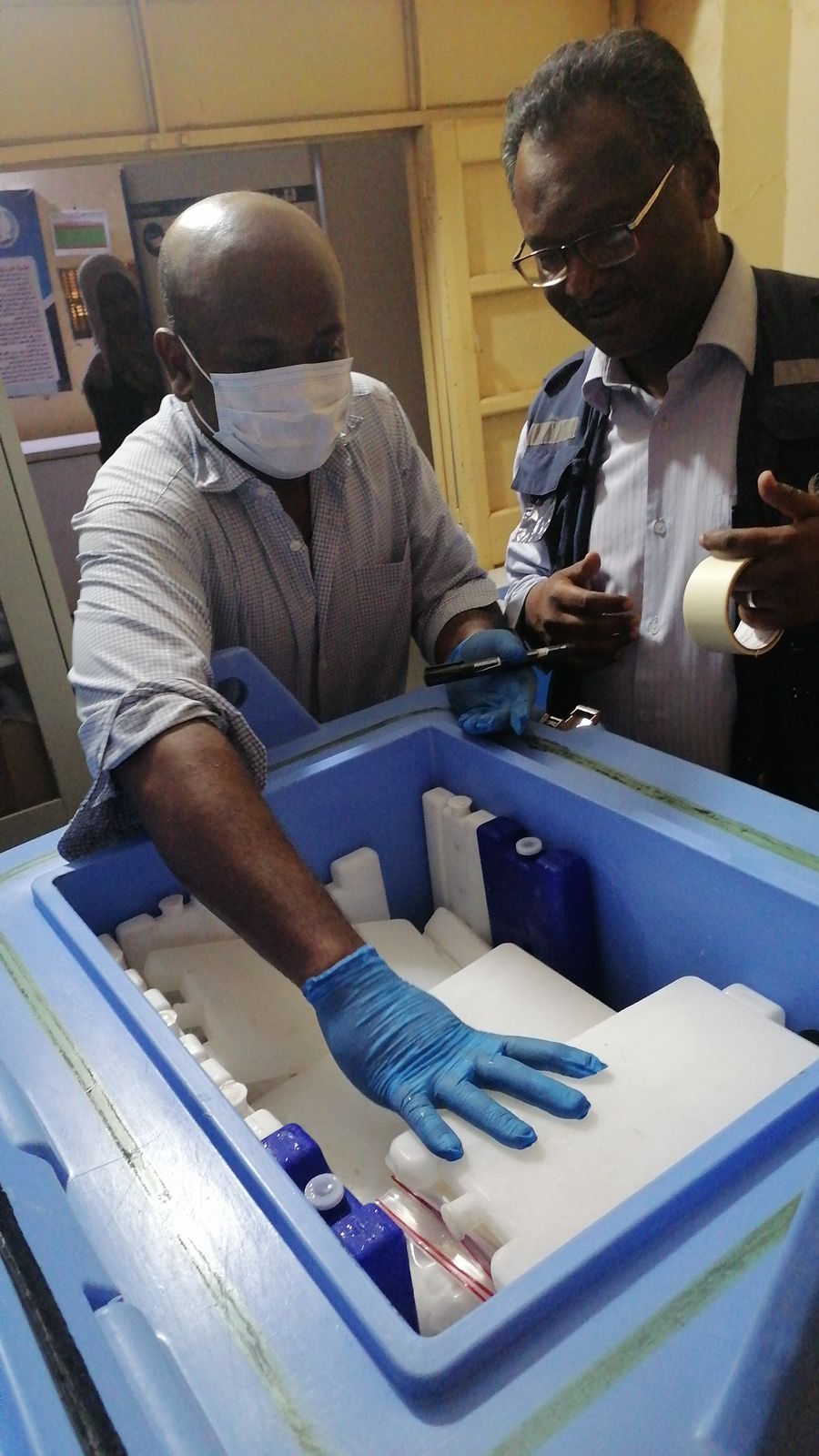
In June, the polio programme in Sudan completed a pilot mission to transport stool samples to the VACSERA laboratory for testing. With the conflict impacting movement and security on the roads, creativity was required to get the samples from collection points identified, such as Gezira to Port Sudan to Dongola, all the way to the border. Throughout, health workers relied on two criteria to ensure safe passage for themselves and their cargo: first, their neutrality, and second, their status in communities. The health workers who made this happen are known to and trusted by the communities they serve, and that trust, in many cases built over decades, facilitated their travel by road.
The first shipment of stool carriers passed through five stops in different states following a pathway assessed for security considerations. In Red Sea state, Dr Thabit Mohammed Elsadig, a WHO Public Health Officer, spent three days pulling together all the resources drivers would need, from permits and security clearances to cash, fuel and food. As the situation was formally graded as a level three emergency, this triggered WHO’s Emergency Response Procedures, effectively enabling staff to respond and repurpose resources at speed. In some cases, Dr Thabit and others used their own resources to make things happen.
At each stop, health workers picked up more stool samples from their colleagues. They checked temperature controls in the sample carrier and replaced old ice packs with fresh ones to maintain temperature and handling protocols of the reverse cold chain.
With the occupation of the National Public Health Lab in Khartoum by one of the parties, Hatim Babiker Othman, National Coordinator for the Polio Lab in Sudan, moved to Port Sudan during the first month of the conflict and started to restructure the polio lab’s functions. He organized samples in small boxes, assigned lab numbers, and established effective communication with the focal point in Egypt, to coordinate the handover of samples. Hatim traveled with the samples from Port Sudan to Atbara, Dongola, and finally, the Argeen border crossing point.
Meanwhile, WHO colleagues contacted the Egyptian Ministry of Health to confirm that, at last, the samples were on their way to the border. At the Argeen Gate, border officials examined the boxes and their contents. Dr Thabit recalled thinking that if anything went wrong at this point, all their efforts – days of planning and transport by road – would have gone to waste.
“The sample carriers were like trunks of gold for us. We hoped they would treat them well, and they did,” he said, with reference to their value in signaling any epidemiological developments related to the ongoing variant poliovirus outbreak.
Exemplary inter-country support
Once they received a prompt from WHO, a team from Egypt’s Aswan Governorate of Health set out on a six-hour journey to the shared border. There, they collected the samples and headed back to the health facility in Aswan for more fresh ice packs before driving to the VACSERA laboratory in Giza, a 14-hour drive away. The entire journey from Madani, Sudan, to Giza, Egypt, can take up to 56 hours and demands absolute precision in planning and execution.
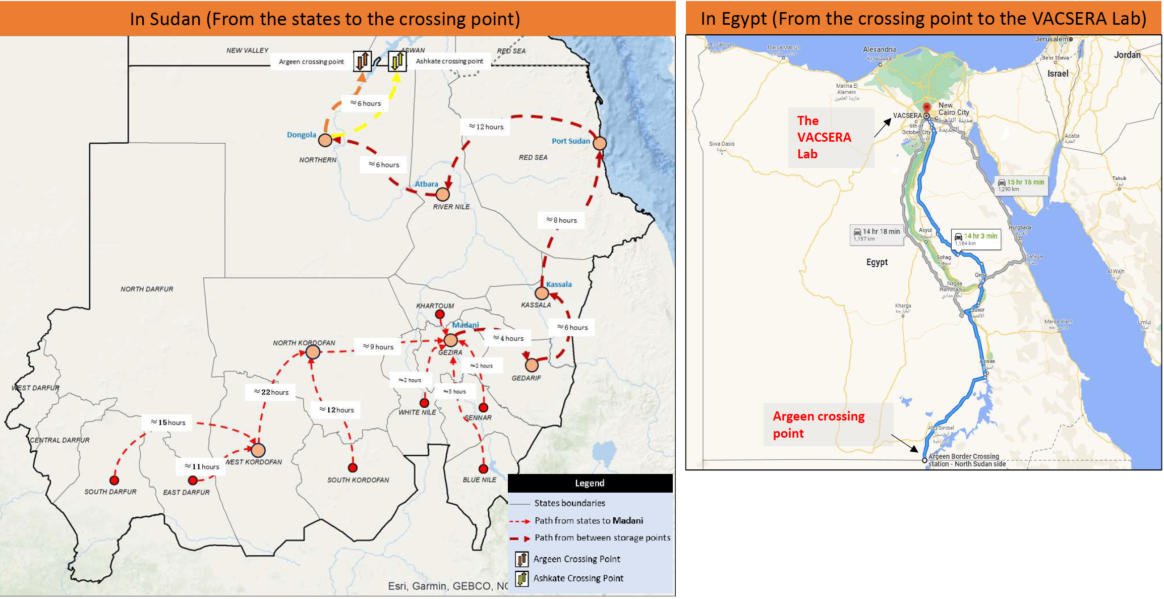
Acknowledging Egypt’s generous support, Dr Ni’ma Saeed Abid, WHO’s Representative in Sudan said, “Our partners in Egypt have demonstrated how strong inter-country collaboration can help in ending diseases. We remain grateful to them for their timely support, and to every link in this chain of coordination. This support is a demonstration of ‘delivering as one WHO’.”
On 16 June 2023, VACSERA received a shipment of 56 stool samples for testing for poliovirus. Lab personnel prioritized Sudan’s samples for immediate testing, and the testing process began on the day of arrival. Final results were shared in 11 days — a full 10 days less than the standard three weeks. The results were also good news: no sample tested positive for variant poliovirus.
“Our heroic health workers stayed to deliver our mandate and support the most vulnerable communities in the face of the ongoing conflict,”
Dr Nima said. “They are continuously finding extraordinary solutions to continue to protect children from polio and other vaccine-preventable diseases. This is a lesson to be followed by the integrated disease surveillance team. It reinforces what we believe in: everything is possible, with strong determination and will.”
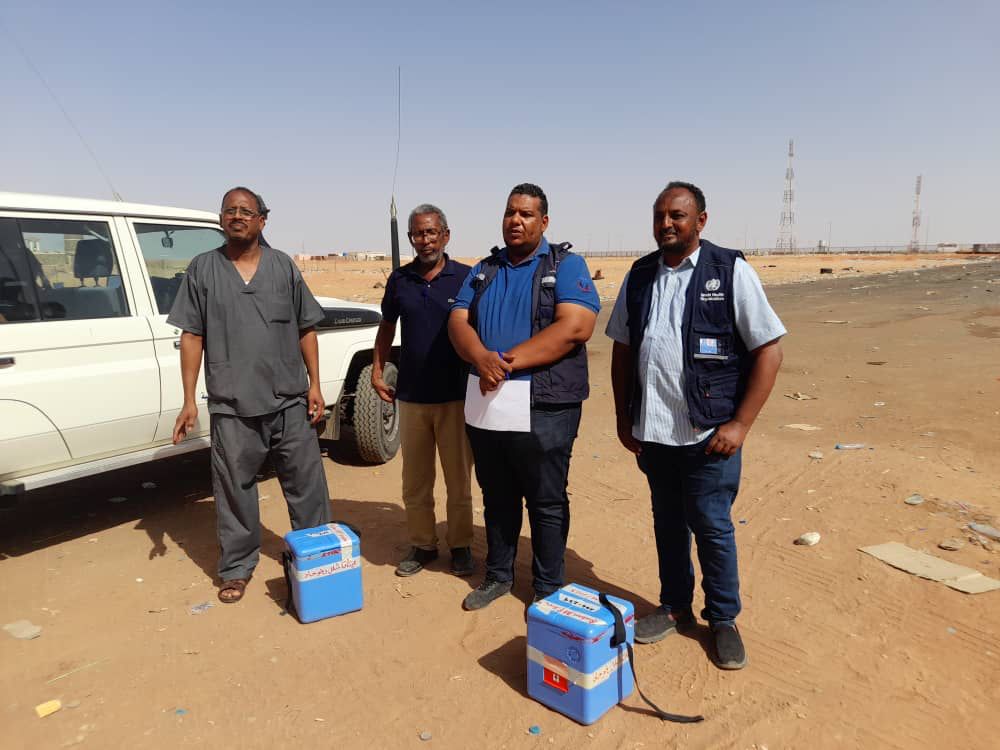
For additional information on how the Sudan conflict affected the polio programme and health systems in the country, please watch this video.





